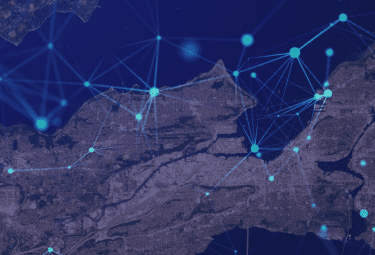Innovation to Impact. See you at the July ESIP Meeting.
Practical AI for Earth Science Data

The Machine Learning Cluster brings technical expertise in Artificial Intelligence (AI) to the broader Earth Science Information Partners (ESIP) community. Check out the Cluster’s new paper on practical AI that demonstrates open science practices and open access publishing.
What we do: Advance machine learning in Earth sciences by encouraging collaboration and innovation among researchers, data scientists, and technologists.
Why we do it: Improve environmental decision making. We are motivated by the urgency of climate change to enhance predictive capabilities and offer innovative solutions to complex data challenges.
ESIP Machine Learning Cluster
A new publication is available, collaboratively authored by the ESIP Machine Learning Cluster: “Towards practical artificial intelligence in Earth sciences” in Computational Geosciences (doi.org/10.1007/s10596-024-10317-7).
The paper explores successful use cases in applying Artificial Intelligence (AI) in Earth sciences, emphasizing both the practical applications and the limitations that still need to be addressed. As stated, “This paper aims to capture the landscape of AI-powered geospatial data sciences by discussing the current and upcoming needs of the Earth and environmental community, such as what practical AI should look like, how to realize practical AI based on the current technical and data restrictions, and the expected outcome of AI projects and their long-term benefits and problems.” The AI and Machine Learning (ML) tools are constantly evolving — and that means leading practices for Earth science are evolving too.
“This work explores the current challenges and emerging trends in AI-driven geospatial data science, offering insights into how the field can evolve to address practical needs in Earth sciences,” said Ziheng (Jensen) Sun, lead author and chair of the ESIP Machine Learning Cluster. Sun highlights the paper’s contribution to position the community for more AI-powered scientific findings.
How the work gets done matters as well.
The Machine Learning Cluster is dedicated to collaborating across institutions to discuss cutting-edge AI technologies, experiment with new ideas and create community-friendly, open-access publication processes, ensuring AI research results are freely available to the global community.
In the Earth science data community, people emphasize making datasets, knowledge and research accessible to everyone, which will be the foundation for AI successes. Open access is a critical pathway, but the complexities involved are often overlooked. The Machine Learning Cluster played a pivotal role in coordinating the efforts, streamlining communication and securing the necessary resources to make this publication possible.
Talya ten Brink from NOAA Fisheries is a corresponding author alongside Sun. The full list of authors includes many researchers, students and engineers from across the ESIP community, including Cluster participants, three former ESIP Community Fellows, staff, Board members, ESIP Lab award winners and ESIP Meeting session organizers. The authors span four federal agencies, a python data science company and 11 academic institutions, which geographically connects a global network of Earth science data professionals.
Join the conversation by participating in one of the monthly calls via the ESIP Community Calendar or catch their next breakout session at the ESIP Meeting.
This blog was written by Jensen Sun, Jyoshmitha Reddy Paturi and Allison Mills with edits from Megan Orlando.
ESIP stands for Earth Science Information Partners and is a community of partner organizations and volunteers. We work together to meet environmental data challenges and look for opportunities to expand, improve, and innovate across Earth science disciplines.Learn more esipfed.org/get-involved and sign up for the weekly ESIP Update for #EarthScienceData events, funding, webinars and ESIP announcements.



